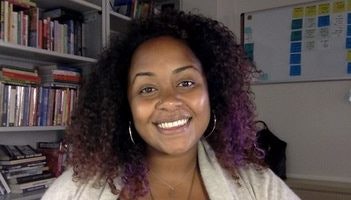Raised in Hoboken, New Jersey, Dr. Yomaira Figueroa is a first-generation high school and college graduate. Now an assistant professor of global diaspora studies at Michigan State University, she finds the cultural shift in academia encouraging as more first-generation students continue their education and become professors.
Colleges and universities have become “a more welcoming place for folks like me” she says, “because other folks like me have paved the way.”
Figueroa mentors students and junior faculty like her “from a place of knowing.” In addition, she founded the MUSE (Mentoring Underrepresented Scholars in English) Scholars Program, a four-day experience for prospective graduate
 Dr. Yomaira Figueroa
Dr. Yomaira Figueroastudents to help recruit and retain a diverse cohort. She’s also a past winner of Michigan State University’s Faculty Leadership Award and Inspirational Woman of the Year Award for her Women of Color Initiative, which organizes events for women of color on campus.
With the influx of new perspectives, scholarship has changed, Figueroa says. Academics from working class backgrounds ask different questions that others might not explore, and, as a result, “the work becomes really rigorous and really generous.”
“For me, it’s really about how do we approach the questions that we have,” she notes. “There are some things people can understand because they’ve lived it. Other people can understand because they’ve studied it. But it’s not the same.”
Figueroa’s own life experiences inform her scholarship. Motivated by her family roots, she originally wanted to focus her studies on the Puerto Rican diaspora. But her graduate education in ethnic studies at the University of California Berkeley broadened her scope, exposing her to many histories of people of color in the United States.
She found that “when you put them into relationship with one another, you get this really powerful view of the human experience.”
That’s exactly what she does in her soon-to-be-published first book, Decolonizing Diasporas: Radical Mappings of Afro-Atlantic Literature, which explores post-1960s literature emerging from Puerto Rican, Cuban, Dominican and Equatoguinean communities in the U.S. and Spain. She links their colonial histories and delves into shared themes in their work, including a discussion of what reparations beyond money could look like.
Her second book, which is her current work, will focus on where Afro-Puerto Ricans appear — and don’t appear — in historical archives and other forms of media. The idea was sparked by her own “frustration” looking for family documents in Puerto Rico and Spain.
For example, when she asked archivists in Seville about documents on the slave trade, they seemed alarmed. She remembers thinking, “I’m a Black Puerto Rican woman standing in front of you. How do you think it happened that I’m speaking your language? Do you think it’s, like, magic?”
But then, she happened upon images of her family members in unlikely places — a photo in a documentary project on the Puerto Rican diaspora and a film about a famous fire in Hoboken.
She describes the book as a “scholarly” and “personally inflected” project to “look at the ways Black Puerto Ricans emerge in other things that are not the archives.”
Dr. Justus Nieland, chair of Michigan State University’s English department, calls Figueroa a “transformative intellectual leader” and “field-changing scholar” in a written statement to Diverse. Figueroa has a joint appointment in his department and African American studies.
“Her work is truly transnational and transdisciplinary, working deftly across the historical and cultural contexts of multiple geographies, identities and experiences of coloniality,” he writes. “Dr. Figueroa models the kind of vision and dedication necessary to transform academia and make it more just, equitable and inclusive.”
Dr. Yomaira Figueroa
Title: Assistant Professor, Global Diaspora Studies, Michigan State University
Education: Bachelor’s degree, English, Puerto Rican & Hispanic Caribbean Studies, Women’s & Gender Studies, Rutgers University; Master’s degree, Ethnic Studies, University of California Berkeley; Ph.D., Ethnic Studies, University of California Berkeley
Age: 35
Career mentors: Dr. Nelson Maldonado-Torres, Rutgers University; Dr. Yolanda Martinez-San Miguel, University of Miami; Dr. Carlos Decena, Rutgers University; Dr. Keith Feldman, University of California Berkeley; Dr. Trinh Minh-ha, University of California Berkeley; Dr. Tsitsi Jaji, Duke University; Dr. Margo Crawford, University of Pennsylvania; Dr. Sandra Rocio Castro, Rutgers University; Dr. Lorgia García Peña, Harvard University
Words of wisdom/advice for new faculty members: “Asking for advice is so important but also being open to critique and criticism is important. For me, it’s really important to remember we don’t get here by ourselves.”
This article appeared in the January 23, 2020 edition of Diverse.
This is one in a series of profiles about this year’s 2020 Emerging Scholars. Read about all of them here.



















